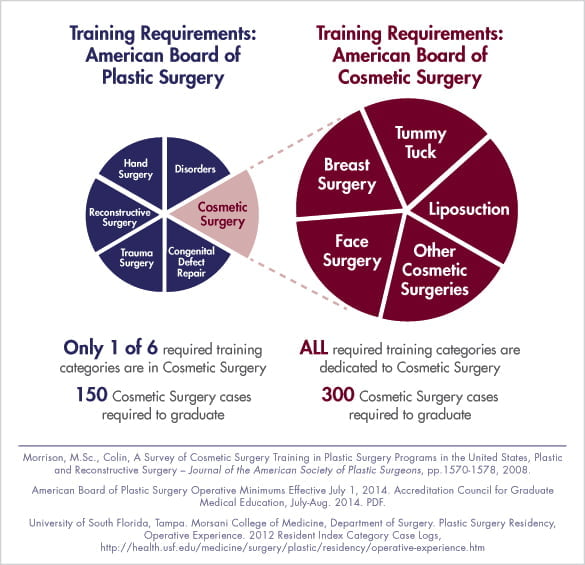Although the terms “cosmetic surgery” and “plastic surgery” are frequently used interchangeably in everyday conversation, they’re not actually the same thing. There are a lot of similarities, of course, but there are also some important differences. If you’re pondering cosmetic or plastic surgery, it’s a good idea to familiarize yourself with these differences before making your decision.
Cosmetic vs Plastic Surgery: The Basics
The umbrella term “plastic surgery” can relate to any of a range of surgical specialties, each of which focuses on restoring natural form or function to the body. Cosmetic surgery is one of 6 categories involved in plastic surgery training:
- Hand surgery
- Skin disorders
- Reconstructive surgery
- Trauma surgery
- Congenital defect surgery
- Cosmetic surgery
Cosmetic surgery focuses more specifically on improving the appearance, although the benefits aren’t necessarily purely aesthetic. Many people experience a boost in self-confidence after cosmetic surgery, and some procedures, most notably liposuction or a tummy tuck, may also have some medical benefits.
The categories in which cosmetic surgeons receive training include:
- Body contouring procedures
- Breast enhancement procedures
- Dermatologic cosmetic surgery
- Facial cosmetic surgery
 Graphic Provided By: American Board of Cosmetic Surgery
Graphic Provided By: American Board of Cosmetic Surgery
Cosmetic vs Plastic Surgery: The Differences
Now that you’re slightly more familiar with the basics of cosmetic vs plastic surgery, what are these differences you need to be aware of?
- All plastic surgeons must complete medical school and a residency. During this time, they may choose to focus on cosmetic surgery as a subspecialty.
- While cosmetic surgeons also start with medical school and a residency, they then move on to additional training focusing specifically on aesthetic procedures.
- Board-certified cosmetic surgeons are required to complete 300 cosmetic procedures during their training, compared to just 55 for board-certified plastic surgeons.
Choose Your Cosmetic or Plastic Surgeon Wisely
When you’re making the choice between a cosmetic surgeon vs a plastic surgeon, the most appropriate option will depend on your what you’re looking to achieve. If the focus of your procedure will be correcting a congenital defect or injury, you may want to seek out a board-certified plastic surgeon. However, if you’re interested in aesthetic improvements to your face or body, a board-certified cosmetic surgeon may be more suitable.
Since cosmetic surgeons complete residency training and fellowship training focused on cosmetic surgery, remember to look for information on those training programs as well as residency and post-residency experience when making your shortlist of suitable board-certified cosmetic surgeons.
Whatever your final decision, you should only ever choose a board-certified cosmetic or plastic surgeon with specific experience in the procedure you’re interested in. To make the most out of your cosmetic surgery consultation, you and your prospective surgeon should discuss the specifics of your circumstances and your planned procedures before identifying the most appropriate course of action. This is also a good time for your surgeon to ensure your candidacy before moving forward.
On a personal level, make sure you feel comfortable working with your surgeon. You’ll likely have some sensitive questions you’d like answered at some point in your cosmetic surgery journey, and you are, after all, entrusting your health and wellbeing to them. Some tips that may help you while researching include looking for regular, recent experience of performing the procedure you’re interested in as well as reading online reviews and testimonials.

Dr. James Koehler at Eastern Shore Cosmetic Surgery provides today’s most popular cosmetic surgery and nonsurgical options. Choose from breast enhancement procedures such as breast augmentation, body sculpting procedures including liposuction and tummy tucks, and facial procedures such as facelifts, BOTOX® Cosmetic, and much more. We are dedicated to providing outstanding care and results. Come in for a visit and see our difference for yourself!




